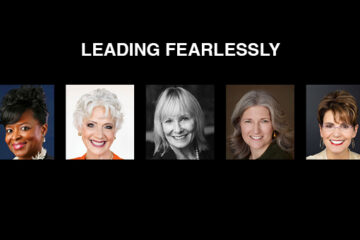Leading Fearlessly: Beyond the comfort zone: Embracing self-advocacy for career growth


Have you ever found yourself downplaying a significant achievement, that little voice in your head whispering that sharing it might come across as boastful? I certainly have. I remember vividly the day I received an email informing me I’d been recognized with a prestigious industry award. My initial reaction was a surge of pride, quickly followed by a wave of unease. How would I share this with my team, my colleagues, the broader company? The fear of being perceived as boastful loomed large. I decided to keep it relatively quiet, a small personal victory acknowledged only by a few close confidantes.
Then, a conversation with a trusted friend, a woman executive I deeply admired, shifted my perspective entirely. When I tentatively mentioned the award, almost as an aside, she stopped me. “You must share this,” she said, her voice leaving little room for argument. “This is not bragging – it’s visibility. Sharing this is about setting an example, about letting others see what’s possible, and frankly, it’s about taking the credit you’ve earned.” She went on to say that for too long, women have been conditioned to shrink, to let their accomplishments speak for themselves, often into an empty room – but that our stories and our successes need to be seen.
My friend’s words came back to me after reading recent findings highlighted in a Harvard Division of Continuing Education article, “Women don’t self-promote – but maybe they should.” The research cited reveals a significant “gender promotion gap,” where “women systematically provided less favorable assessments of their own past performance and potential future ability than equally performing men.” This isn’t necessarily a matter of lacking confidence, but rather a reflection of societal conditioning that often discourages women from actively touting their achievements.
As Areen Shahbari, CEO of Shahbari Training and Consultancy, points out in the article, “If you don’t self-promote, your contributions will probably not be visible nor recognized, which will limit your ability to get a promotion, a raise, or important projects that will help you advance in your career.” My friend’s insistence on the importance of visibility directly reinforced how this tendency to remain unseen holds us back.
Consider the countless hours you’ve poured into your work, the challenges you’ve overcome, the innovative solutions you’ve championed. Haven’t there been moments when your contributions were either overlooked or attributed elsewhere? This isn’t always intentional, but it’s a reality shaped by ingrained societal norms that often favor male self-promotion while subtly discouraging the same in women.
While this hesitancy to self-promote also happens with some men, women are more often socialized to be team players, to prioritize collaboration, sometimes at the expense of individual recognition. A recent article in Public Relations Society of America, called “Women benefit from self-promotion,” underscores this, revealing that “most women would rather minimize their successes than discuss them.” The study they cite found that a staggering 40% of women would rather quit social media for a week than talk about themselves publicly, highlighting the deep-seated discomfort many of us feel with self-promotion.
However, in the executive arena, visibility is currency. It dictates who gets tapped for critical projects, who is considered for leadership roles, and ultimately, who shapes the future of our organizations. By consciously and confidently sharing our successes, we not only claim our space but also actively dismantle the unconscious biases that can keep women underrepresented at the highest levels. A recent Forbes article, “How women can use personal branding to accelerate career success,” directly addresses this, stating, “Building a strong personal brand helps bridge this gap by increasing visibility. When women actively manage their reputations, they have greater control over how they’re perceived, making it easier for others to recognize their expertise and leadership potential.” My friend understood this intuitively – that sharing my award wasn’t about personal glorification but about strategically building my professional narrative and empowering women to strive in their own careers.
Telling your story isn’t about aggressive boasting. It’s about strategic communication, about articulating your value proposition clearly and consistently. It’s about understanding that your achievements are not just personal wins; they are proof points of your capabilities and your leadership potential. When you share your successes, you are not just highlighting a past accomplishment; you are signaling your readiness for future challenges and opportunities.
Visibility is important – especially for women working to be seen and heard in spaces where they’ve often been overlooked. But when social posts focus more on being seen at every event or capturing the perfect selfie, rather than on the value you bring or how you’re serving others, the message can get lost. True professional presence isn’t just about showing up – it’s about showing why it matters that you’re there.
As Claire Wasserman, founder of Ladies Get Paid, advises in the Forbes piece, “Everything you share should be about the value you bring someone else, and your personal brand is the way you do that.” Framing our achievements in terms of their impact and the value they deliver can make self-promotion feel more authentic and less like bragging.
Consider the impact of your silence. When you downplay your achievements, you inadvertently reinforce the very norms that hold women back. You miss an opportunity to inspire others, to demonstrate what strong female leadership looks like and to build the network of allies and advocates that are crucial for long-term career success. As the PRSA article points out, “A majority of women (83%) have been inspired by hearing women talk about their successes and accomplishments.” By keeping our achievements quiet, we not only diminish our own visibility but also deprive other women of the inspiration and role modeling they need.
So, the next time you achieve something significant, resist the urge to minimize it. Instead, think of it as an opportunity – an opportunity to own your narrative, to inspire those around you, and to strategically position yourself for future growth. Let’s move beyond the ingrained hesitation and embrace the power of sharing our stories, not as an act of self-aggrandizement, but as a vital step toward equitable recognition and the continued ascent of women in leadership.
Your voice and your accomplishments matter. Make them heard.
For advice on owning our own narratives and ensuring our achievements are recognized, I turned to local leaders:

Suzanne Heckenlaible, vice-president, public affairs, Delta Dental of Iowa and executive director, Delta Dental of Iowa Foundation
Women must find ways to promote their work success and achievements. I take great pride in not only owning my work but also promoting the successes of my team. I am fortunate to be part of an organization that leverages my strengths and aligns with my passions. A great way for women to elevate their leadership skills outside of work is getting involved in professional, civic or charitable organizations to demonstrate their key attributes. My recommendation is to work in environments where your leadership contributions are acknowledged, valued and rewarded. Life is too short – work hard, aim high, support others and own your success.

Dr. Lauren Patrick, cosmetic dentist, University Dental Group
Be the expert! There is a saying that the best way to master a subject is to teach it. But I would also add that visibility most easily comes from teaching and creating value around a subject. Many of us assume that our colleagues and community members know the intimate details of what we do and how we do it, when in reality, most of us have no clue about the day-to-day operations of those we engage with regularly. So teach them! What is something interesting about the work you did today? Tell someone! Whether in-person or on social media platforms, it is vital to use your voice, consistently show mastery of your niche and interest in the future of your industry.

Diana Wright, startup community builder, Greater Des Moines Partnership
As someone who is a quiet leader and has the personality inside an organization as a “secret weapon,” this question is particularly interesting to answer.
My style uses mystique and innovation. I would describe myself as a nimble problem-solver, unassuming, independent and autonomously creative. I love to contribute great ideas and often am a quiet force for change.
Being quiet doesn’t mean you can’t articulate your value. For me, it’s an advantage to use the language of listening.
Once you understand what makes you valuable to others, aka your personal brand, you can be more authentic and confident. For women who want to be more visible, you don’t have to change who you are. Instead, you must become more of who you are.

